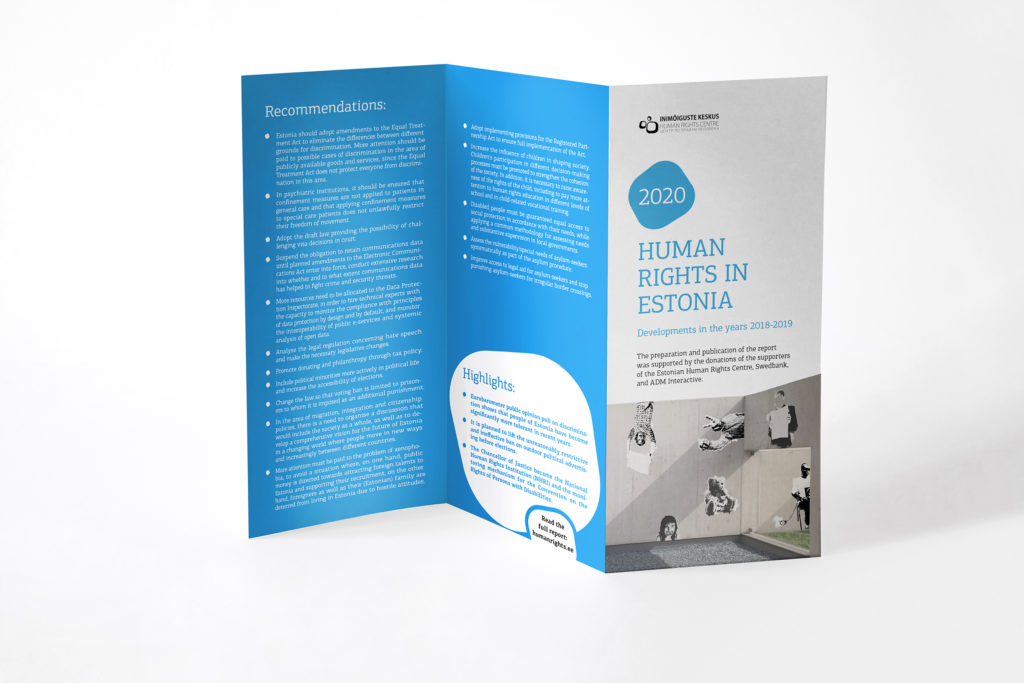Summary of Key Findings on – (PDF)
In 2018-2019, there has been slow progress in several areas towards better protection of human rights. The Chancellor of Justice has received an important role as National Human Rights Institution and as a monitoring mechanism for the Convention on the Rights of Persons with Disabilities. Awareness of the protection of personal data has increased, and the ban on outdoor political advertising, which has consistently been criticised in our reports, is being lifted. On the other hand, the government, which came into power in the spring, has ruled out any further involvement in the resettlement of refugees, and there has been no curb on the spread of hate speech and hate crime. However, in most areas there has been no significant deterioration or improvement.
Human rights in Estonia are not yet in crisis. But the warning signs, which we also highlight in the report, should make all human rights supporters think. When standing up for human rights in any area – in politics, in the media, in state or local government agencies, NGOs, schools, youth centres, cultural institutions, businesses or anywhere – more work is needed to establish a human rights culture. This means treating human rights not only as constitutional or international obligations or requirements, but as part of the fundamental values of our society. It means giving meaning to our activities in the framework of human rights. It means educating ourselves and others on human rights issues in understandable language and manner. It means standing up for human rights even when it is neither easy nor convenient.
Pause for thought:
- Political attacks by right wing extremists on the independence of the judiciary are continuing.
- Political pressure is applied on journalists who are critical towards the media and the government, there are examples of intervention by the owner in the newspaper Postimees.
- In violation with international law, the jurisprudence of the Court of Justice of the European Union and the European Court of Human Rights, long-term retention of communications data of Estonian population is continuing.
- The Chancellor of Justice and the Supreme Court have identified excessive length of solitary confinement for prisoners and recommend that different instances of solitary confinement should not be applied consecutively.
- There have been attacks on the funding for human rights NGOs.
- Separation continues between the Estonian- and Russian-speaking populations in Estonia: there are still divisions between the two communities in education, labor market, living environment, media consumption, etc.
- While political speech and actions have become more hostile towards LGBT+ persons and their rights, the attitude of the Estonian population towards LGBT+ community has improved, and the number of people who consider the Registered Partnership Act necessary has increased.
- There are continued problems in the field of psychiatric care with involuntary treatment and placement to closed institutions.
- The government decided to end its participation in resettlement and relocation programmes for persons in need of international protection.

Recommendations:
- Estonia should adopt amendments to the Equal Treatment Act to eliminate the differences between different grounds for discrimination. More attention should be paid to possible cases of discrimination in the area of publicly available goods and services, since the Equal Treatment Act does not protect everyone from discrimination in this area.
- In psychiatric institutions, it should be ensured that confinement measures are not applied to patients in general care and that applying confinement measures to special care patients does not unlawfully restrict their freedom of movement.
- Adopt the draft law providing the possibility of challenging visa decisions in court.
- Suspend the obligation to retain communications data until planned amendments to the Electronic Communications Act enter into force, conduct extensive research into whether and to what extent communications data has helped to fight crime and security threats.
- More resources need to be allocated to the Data Protection Inspectorate, in order to hire technical experts with the capacity to monitor the compliance with principles of data protection by design and by default, and monitor the interoperability of public e-services and systemic analysis of open data.
- Analyse the legal regulation concerning hate speech and make the necessary legislative changes.
- Promote donating and philanthropy through tax policy.
- Include political minorities more actively in political life and increase the accessibility of elections.
- Change the law so that voting ban is limited to prisoners to whom it is imposed as an additional punishment.
- In the area of migration, integration and citizenship policies, there is a need to organise a discussion that would include the society as a whole, as well as to develop a comprehensive vision for the future of Estonia in a changing world where people move in new ways and increasingly between different countries.
- More attention must be paid to the problem of xenophobia, to avoid a situation where, on one hand, public money is directed towards attracting foreign talents to Estonia and supporting their recruitment, on the other hand, foreigners as well as their (Estonian) family are deterred from living in Estonia due to hostile attitudes.
- Adopt implementing provisions for the Registered Partnership Act to ensure full implementation of the Act.
- Increase the influence of children in shaping society. Children’s participation in different decision-making processes must be promoted to strengthen the cohesion of the society. In addition, it is necessary to raise awareness of the rights of the child, including to pay more attention to human rights education in different levels of school and in child-related vocational training.
- Disabled people must be guaranteed equal access to social protection in accordance with their needs, while applying a common methodology for assessing needs and substantive supervision in local governments.
- Assess the vulnerability/special needs of asylum-seekers systematically as part of the asylum procedure.
- Improve access to legal aid for asylum-seekers and stop punishing asylum-seekers for irregular border crossings.
Highlights:
- Eurobarometer public opinion poll on discrimination shows that people of Estonia have become significantly more tolerant in recent years.
- It is planned to lift the unreasonably restrictive and ineffective ban on outdoor political advertising before elections.
- The Chancellor of Justice became the National Human Rights Institution (NHRI) and the monitoring mechanism for the Convention on the Rights of Persons with Disabilities.
*Summary of Key Findings on – (PDF)
*The full report will be available in English next year
